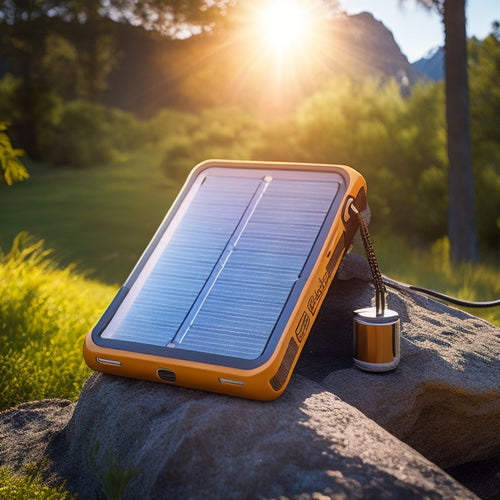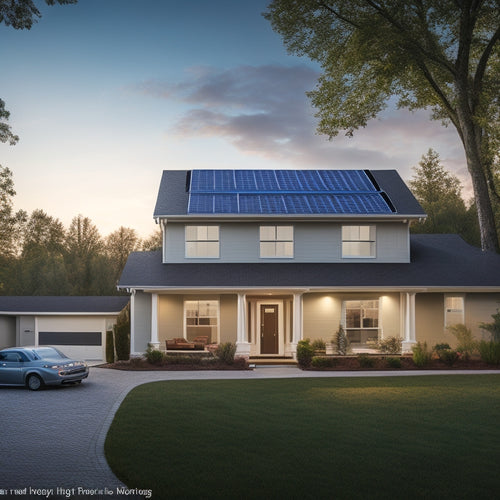
What's the Cost of Local Panel Installation?
Share
You're likely looking at an upfront investment of $15,000 to $30,000 to install solar panels on your home, depending on the system's size and complexity, as well as the local installation costs in your area. Factors like location, labor costs, and system type impact the final cost, so it's crucial to evaluate these when planning your installation. Financing options, local incentives, and bulk purchase discounts can help reduce your out-of-pocket expenses. By understanding the breakdown of costs and investigating ways to optimize your investment, you can make a more informed decision - and there's more to uncover on how to make solar energy work for you.
Overview
- Local solar panel installation costs vary by state, city, and neighborhood, ranging from $15,000 to $30,000 for a typical US homeowner.
- System size and complexity significantly affect overall installation costs, which can be reduced with financing options and local incentives.
- Installation location influences pricing due to building codes and labor costs, with urban areas potentially having higher labor costs.
- The type of panel chosen impacts cost, with high-efficiency panels being more expensive, and system compatibility optimizing energy harvest.
- Labor costs can vary between $2,000 to $10,000 based on installation complexity, and researching local installers can provide competitive pricing.
Understanding Solar Panel Costs
Your wallet takes a hit when you consider switching to solar energy, and rightly so - the upfront cost of solar panels can be substantial.
However, you shouldn't let the initial investment deter you from utilizing the power of the sun. By optimizing solar panel array and installation, you can increase energy output and reduce costs in the long run.
There are various solar incentives and financing options available to help offset the costs. You can investigate federal and state tax credits, rebates, and grants that can greatly reduce your expenses.
Additionally, financing options like loans and power purchase agreements can provide you with the flexibility to go solar without breaking the bank.
Average Installation Prices Near Me
Determine your local solar panel installation costs by researching average prices in your area.
You'll find that installation prices vary depending on the state, city, and even neighborhood you're in. On average, homeowners in the US pay between $15,000 and $30,000 for a solar panel system.
However, with installation financing options and local incentives, your out-of-pocket costs could be considerably lower.
System size and complexity play a key role in determining the overall cost, as larger systems require more components and infrastructure.
For example, some states offer rebates or tax credits that can reduce your upfront costs. Additionally, many solar panel companies offer financing options with low or no down payments.
Factors Affecting Local Installation Cost
As you research local solar panel installation costs, it's clear that several factors influence the final price tag.
The installation location is a significant factor, as local building codes, permits, and labor costs vary by region. For instance, installations in urban areas may be more expensive due to higher labor costs and complex roof structures.
System compatibility and integration high efficiency ratings also play an essential role in determining the overall cost, as a well-integrated system can optimize energy harvest and reduce downtime.
The type of panel you choose also affects the cost. High-efficiency panels, like bifacial or premium monocrystalline panels, are more expensive than standard panels.
Additionally, the system size, installation company, and mounting type also impact the final cost.
Cost Breakdown of Solar Panels
Breaking down the cost of solar panels helps you pinpoint areas where you can optimize your investment. When you understand the individual components, you can make informed decisions about your solar panel system.
The cost of solar panels varies depending on the type, with monocrystalline panels being the most expensive and polycrystalline panels being the most affordable. Installation incentives, such as the federal solar investment tax credit, can greatly reduce your upfront costs.
Additionally, solar battery storage systems can range from $5,000 to $15,000 or more, based on size and type, which can further impact your overall investment. Other costs to take into account include inverters, mounting hardware, and labor costs, which can range from $2,000 to $10,000 depending on the complexity of the installation.
Tips for Reducing Installation Costs
You've optimized your solar panel system's components to fit your budget and energy needs, but now it's time to focus on reducing the overall installation costs.
One way to do this is by exploring financing options that work best for you. Look into local and national incentives, such as tax credits or rebates, that can help offset the upfront costs.
Additionally, consider partnering with a local installer who can provide competitive pricing and efficient installation processes.
Don't forget to inquire about any installation incentives they may offer, such as discounts for referrals or bulk purchases.
Frequently Asked Questions
Do I Need to Upgrade My Electrical Panel for Solar Installation?
You'll likely need to upgrade your electrical panel for solar installation if it can't handle the increased electrical capacity from the solar panels, requiring a more durable panel that can accommodate the added power flow.
Can I Install Solar Panels on a Metal Roof?
You're free to utilize solar energy on your metal roof, leveraging its advantages like durability and weather-tightness, but consider installation challenges like specialized mounting systems and potential noise issues before making the switch.
Are There Any Solar Panel Maintenance Requirements?
You'll need to perform routine solar panel maintenance, including cleaning the panels regularly to guarantee peak energy utilization and scheduling inverter servicing every 5-10 years to maintain system efficiency and extend its lifespan.
Can I Install Solar Panels Myself to Save Money?
You're considering a DIY installation to save money, but be aware that improper setup can void warranties and compromise efficiency, so weigh the cost savings against potential risks and consider seeking professional guidance.
Will Solar Panels Increase My Property Value?
"When in Rome, do as the Romans do" - and in this case, investing in solar panels will "cash in" on increased property value. A property appraisal will reflect the upgrade, aligning with market trends, ultimately enhancing your home's worth and giving you a sense of financial freedom.
Ready to Buy
You've made it to the end of our guide to understanding the cost of local panel installation. The good news is that solar energy is becoming increasingly affordable, with the average cost per watt dropping by 70% over the past decade. By doing your research and choosing the right installer, you can take advantage of this clean and renewable energy source while keeping costs in check.
Related Posts
-

Fastest Solar Chargers for Emergency Power
When choosing the fastest solar chargers for emergency power, you need to focus on features like rapid charging capab...
-

Cost of Solar With Battery Backup
You're investing in a solar panel system with battery backup to guarantee reliable power during outages. The cost of ...
-

Top Solar Powered Camping Fans for Camping Enthusiasts
If you're a camping enthusiast, a solar-powered fan can be a transformative element for your outdoor experience. Thes...


